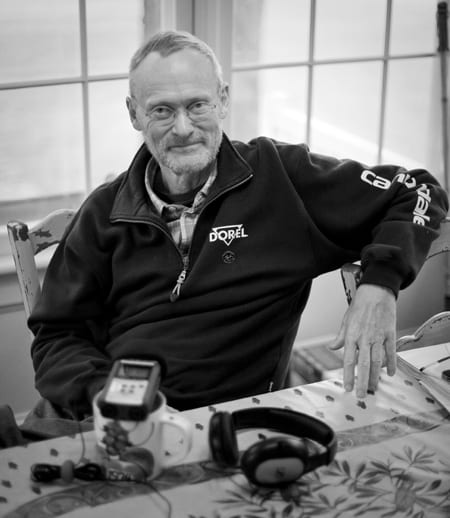By Daniel de la Calle
On this rainy morning I had the chance to meet with Sven for a cup of tea and a half hour chat in his kitchen. We had not done an official interview for the blog since May of last year, so an update on A Sea Change and the work Barbara Ettinger and Sven Huseby do with Ocean Acidification was more than due.
D: Sven, why don’t you tell me what you have been up to over the past six months.
Sven: In November of last year we were invited to participate in London at a gathering of NGOs, foundations and scientists who were looking at ways of building further collaboration between the funding community, the research community and the policy community in Europe and specially in Great Britain. It was right at the time when their government had approved further funding for research on Ocean Acidification and there was the belief that there could be an increase in the number of monitoring stations and new ways to analyze the data coming in. So that was a very hopeful kind of conference, very exciting.
From there we returned to the States. Barbara had actually been exploring a next film project, which was going to be about the US military and sustainable energy systems. We were working on that in the background, but in the meantime we had invitations in February and March to participate in a couple of three-day events, first at Oregon State University and then at the University of Washington.
The first one was actually sponsored by their Philosophy Department and was around the topic of science, media and messaging. We did a three hour seminar with people in the Communications Department and with graduate students in science. We started the first day with a seminar in which we first talked about how you make a film of the kind that we made with A Sea Change. Then we asked the group to break up into four groups and to pick an environmental topic that they would like to make a documentary about. They were to create a narrative tale that would carry the message and organize it in such a way that they could make a pitch to a foundation to raise money for making of the film. Barbara and I represented a foundation and were there to listen and then critique their presentations. In other words, we went through the motions that would not be unusual for the making and funding of an environmental film.

D: Do you think scientists see a need to learn to communicate better, to transmit their findings and inform the public?
Sven: There is no question that scientists feel that a huge challenge within (and I think that is why the philosophy department was pushing this) the science community is addressing the question of whether it is the responsibility of the scientists to speak out, to communicate, to educate around their findings. There was a panel group that talked about this subject at a gathering. Some felt very strongly that it was almost immoral not to speak out, others thought that the definition of a scientist was someone who continues to do the science, that it was for others to pick up what we are learning from science and bring it into the public realm. The minute a scientist gets involved, objectivity, credibility, the scientist’s value to the field of science becomes suspect, questionable. There was one rather poignant moment when one of the scientists expressed the anger and frustration keeping such a position caused him, this impossibility to go out to a mountain top and scream about one’s findings.
When we went to the University of Washington most participants were already graduate students in the field of fisheries or aquatic studies or was an ocean scientist in general. In that arena I would say that there was a stronger sense that there is a need to speak out. But it is always dangerous, because the criticism you can receive for your actions becomes directed not just at you, but to the validity of the work you are doing, and therefore your scientific efforts.
D: I think labs and science departments at universities should have a spokesperson, someone not directly involved in the research who works on its interpretation and on bringing it to the media and the public.
Sven: I completely agree with you, I know Barbara would as well and our dream was to talk with graduate students who still have not decided what their path is going to be and see if there are some of them who will find that role very satisfying, young men and women that would already be grounded in the science, but intrigued into how do you parlay it into something else. My impression in listening to people from various labs in the country is that they would all like to have a person like that. Do they prioritize in such a way that it is at the top of their funding requests? I don’t think so. If they readily had the money, would they do it? I think they obviously would. Most of the labs that I am aware of today are struggling for resources: funding has decreased significantly in the last decade. But this discussion we are talking about here is taking place and at the University of Washington I think there was a clear understanding that this communication is a skill set of its own.
D: Ok, what came after that?
Sven: Well, in March we were going to go back to working on this new film and at that point several things happened in our lives that made us slow down a bit: I broke my arm in a sports injury and we had our dearest dearest friend and companion, our nearly 16 year old lab become very ill, so we returned to the East Coast and nursed him for the last two months of his life. We are now taking a little time off to try to understand what do we do next.
In the meantime I continue to work with foundations, to see if we can keep the pipeline open for funding in the Ocean Acidification sector. I am also continuing to work with the government through a group that I am part of called Ocean Acidification Task Force. It is a subgroup of the Ocean Research and Resources Advisory panel to the Intergovernmental Working Panel on Ocean Acidification. A mouthful, yes, but essentially a group that makes recommendations to the government about where we need to be looking as we invest public resources over the next five to ten years in this sector. Right now it is a little bit on hold; we have finished our first stated mission which was to create a fully dedicated report that was submitted and has been accepted and it’s now undecided whether we are going to be reactivated in the next six to twelve months. It has been intriguing to meet the people working in the policy sector in Washington DC. I am highly impressed with their dedication, with their know-how. They are dealing with a political situation where it is all about cutbacks, which makes this kind of work much more challenging.
D: And A Sea Change, what lies ahead for the film?
Sven: I would love it if we could figure out a way in which to move the film into countries where it still hasn’t had much exposure, particularly countries with large coastal areas. I think in South America, since we have a Spanish version of the film, it could be distributed further in Chile, Peru and Argentina. We have contacts in all three of those countries that we need to work with in order to make that happen. We have had some screenings in China and would love to have more; we also would like to get the film hooked up with some universities there to be used however they see fit, and if there was some way to be on television there that would be even more effective. As always, our objective is to bring Ocean Acidification into the public discourse.
From my own personal point of view, though, the more I could do to mentor others doing this kind of work, to let them experience some success and enjoy the confidence that that breeds, that would be the greatest satisfaction I could see. I do not feel any less energy, but I have less interest in the kind of travel schedule that this work involves. I wish I could say it was based on principles that I would like to slow down a bit, but it’s really more that I am just choosing to play a different role and return more to being the classroom teacher. I am really eager to build the number of people that we can mentor.
D: What have scientists told you about the film since it came out?
Sven: The thing that they single out again and again is that here is a set of scientific findings that have been built into a narrative tale. Because it is a story of legacy and a grandfather-grandson relationship that can be broadly identified with, it engages people with that material in a way that no scientific paper, report or scientist speaking on television could ever do. They find that amusing and they express a tremendous amount of gratitude that Barbara was able to envision a way in which to do that and that we had the drive to move forward and breathe some life into it.


